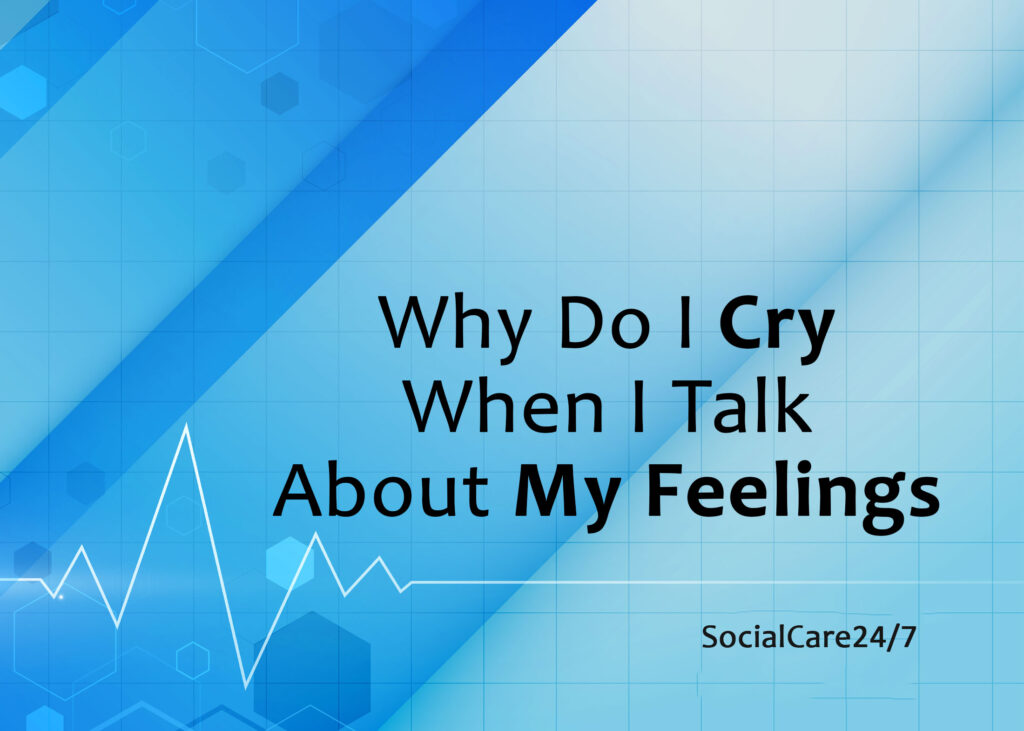We cry to express sadness, grief, and happiness. When you talk about your feelings, crying shows vulnerability. A lot of emotions can cause tears. Like me, you may cry when angry.
Crying may indicate trouble understanding and expressing emotions. If you can’t express yourself, you may cry like a child. Crying when discussing your feelings may seem wrong, especially if you’re a man. Society teaches men not to cry. Society teaches men to be tough and not cry.
Suppose sharing your feelings makes you cry. So, this article will discuss the benefits of crying, the risks of talking about your feelings, and how to handle crying.
What are the Emotional Benefits of Crying?
1. Giving Up Feelings
Crying helps you release and balance your emotions. Some cry when happy, sad, scared, or stressed. Crying can balance emotions, say researchers.
Crying relieves sadness and anger. Tearing up can help you overcome fear or sadness.
Many say crying makes them feel lighter. After a trauma, their body gains emotional balance.
2. Relieve stress
Getting upset and crying reduces stress. Researchers say emotional tears contain toxins and stress hormones.
Researchers say tears contain chemicals that reduce stress, making you feel better. More research is needed to confirm this.
3. Makes you happier
Crying can lift your spirits. Your brain releases oxytocin and endorphins when you cry. They improve mood.
While crying, you take deep breaths of fresh air. This cool air regulates brain temperature, which is good. This improves your mood after crying.
4. Greater empathy for others
If you cry when discussing your feelings, you can be honest. Being honest about your weaknesses helps you empathize with others.
Being comfortable crying in public will help you handle others’ emotions. For instance, the Japanese believe crying is healthy. Crying clubs exist for that reason.
These clubs let people cry safely and healthily, says Sideroff. Also, crying with others makes it seem normal and easier to cry.
Nice if you don’t mind crying in public and can support each other. But they tell their patients not to cry in a business meeting or at work. People may see that as a weakness.
Understand others’ feelings better as you become more comfortable crying in public.
5. Gains support
Crying will let others know you need help when you can’t express it.
Because they think a crying person can’t help themselves, people help.
Crying is a childhood attachment behavior that seeks comfort and care from others.
6. Helps overcome grief
Grief is unique to each person. Sadness has no right or wrong way. Grieving makes you sad, guilty, numb, and angry.
Crying is necessary when sad. Crying helps you accept your loss.
If you’re crying a lot and it’s affecting your daily life, you may have complicated grief. See a doctor.
Ways to Discuss Feelings Without Crying
You may want to stop crying when discussing your feelings. You can control crying when discussing feelings in several ways. These are some options;
1. Discover and Manage Your Triggers
If talking about your feelings makes you cry, figure out why and how to handle it.
What makes you cry is a trigger. Knowing your triggers helps you avoid them.
Knowing what triggers your emotions will help you manage them. If you recognize the signs, you can stop the pattern before it makes you cry.
There are many ways to handle triggers:
Getaway
Stop and leave if you know what makes you cry. This prevents crying. Avoid people who make you cry when angry. Return when calmer.
Make use of props
If stress balls make you cry, they can help you cope. Props help you relax and forget what’s happening.
Think positively
Humor yourself when something upsets you and makes you cry. This is fun and distracting.
Breathe
To regain control, focus on slow breathing when you want to cry.
Close your eyes and blink
Moving and blinking can help you wipe away tears when you want to cry. Look up and place your tongue on the roof of your mouth to cry.
Remove throat growth
You feel a lump in your throat when you want to cry. Swallowing, yawning, or drinking water can remove the lump.
Workout
Working out will help you feel better and distract you from crying.
2. A Safe, Supportive Place to Talk About Your Feelings
Go somewhere no one will judge you if you cry when talking about your feelings.
Talk to a trusted family member or friend to solve your problems—someone else to talk to. Write down your feelings in a journal. To express your feelings without worrying about others’ opinions is great.
If you have no one else to talk to about stress, a trained professional can help.
3. Healthily Discussing and Managing Your Emotions
Learn healthy ways to talk about your feelings if they make you cry. Here are healthy ways to discuss and manage your emotions:
- Meditation and yoga improve mindfulness. Better breathing can help you manage your emotions.
- Be honest with family and friends—they care.
- Discuss your feelings without worrying about word choice.
- Discover a creative hobby that lets you express yourself.
- Show your emotions through body language.
- Discover your triggers and learn how to handle them.
- Define your limits.
- Do not seek emotional approval.
- Stop overthinking.
4. Seeking Professional Help If Needed
If you cry whenever you talk about your feelings, see a professional. A professional can identify your triggers and suggest solutions.
Conclusion
We can’t escape our emotions; they’re us. It’s normal and okay to cry. Everyone cries sometimes. Crying has many benefits. It can boost your mood, relax you, and release pent-up emotions.
It increases your emotional intelligence and empathy and helps you get support. A safe place to discuss feelings is crucial. Learn healthy ways to express and manage your emotions.



